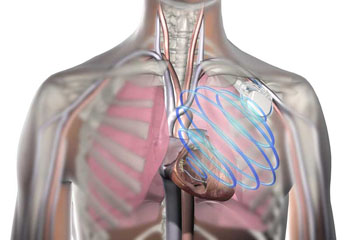FDA Approval for New Cardiac Devices in Advanced Diagnostic Imaging
By MedImaging International staff writers
Posted on 26 Oct 2016
The US Food and Drug Administration (FDA) has approved a suite of cardiac rhythm and heart failure devices, including leads, for use in 3T and 1.5T Magnetic Resonance Imaging (MRI) machines.Posted on 26 Oct 2016
The FDA approval will allow patients fitted with MR-conditional pacemakers, Cardiac Resynchronization Therapy-Defibrillators (CRT-Ds), Implantable Cardioverter-Defibrillators (ICDs), and their leads, to undergo MRI scans.

Image: The OptiVol fluid status monitoring for monitor heart failure in patients with a Medtronic ICD (Photo courtesy of Medtronic).
The approved devices are the Medtronic (Dublin, Ireland) Advisa MRI, and Micra Transcatheter Pacemakers, Amplia MRI and Compia MRI CRT-Ds, Evera MRI and Visia AF MRI DF-1 and DF4 ICDs, Reveal LINQ insertable cardiac monitor, SureScan pacing, defibrillation and left-heart leads. Medtronic is a large medical technology, services and solutions company and manufactures a range of devices for interventional, and surgical treatment of cardiac arrhythmias, and cardiovascular disease.
Yair Safriel, MD, neuroradiologist, CMO, Pharmascan Clinical Trials, and University of South Florida, said, "While 1.5T scanners still comprise the majority of installations, 3T scanners are expected to comprise more than half of new units - with some centers having only 3T scanners - since they offer faster scans and higher resolution images. Approval for MRI conditional scanning at both 1.5 and 3T allows patients to have improved access to MRI at a time and place most appropriate for their care. And with 3T scanning, physicians and radiologists gain a clearer look into soft tissues, particularly critical when diagnosing serious conditions, often involving the brain and spine."
Related Links:
Medtronic














